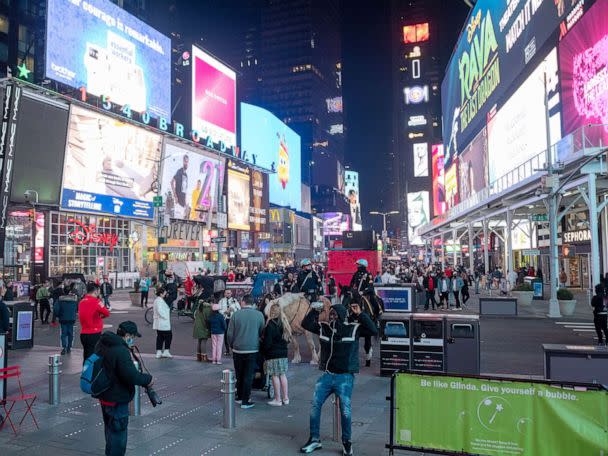You are here
Covid-19 cases are no longer declining in New York City, may be new variants
Primary tabs
 COVID-19 cases have stopped declining in New York City. Experts are trying to find out why. Nationwide, COVID cases have fallen dramatically since the winter peak and millions of vaccine doses started rolling out. Specifically, the New York City metropolitan area had a rate of nearly 260.6 cases per capita for the week ending March 21, the second highest case rate in the nation, according to data from the Centers for Disease Control and Prevention (CDC). Although cases are not as high as they were during the spring and winter surges, the city has “reached a plateau, which simply means that cases are no longer declining,” said Dr. David D. Ho, director of the Aaron Diamond AIDS Research Center at Columbia University. YahooNews
COVID-19 cases have stopped declining in New York City. Experts are trying to find out why. Nationwide, COVID cases have fallen dramatically since the winter peak and millions of vaccine doses started rolling out. Specifically, the New York City metropolitan area had a rate of nearly 260.6 cases per capita for the week ending March 21, the second highest case rate in the nation, according to data from the Centers for Disease Control and Prevention (CDC). Although cases are not as high as they were during the spring and winter surges, the city has “reached a plateau, which simply means that cases are no longer declining,” said Dr. David D. Ho, director of the Aaron Diamond AIDS Research Center at Columbia University. YahooNews Nationwide, COVID cases have fallen dramatically since the winter peak and millions of vaccine doses started rolling out.
But some areas appear to be bucking this trend, including several states and metropolitan areas in the Northeast, which have been reporting high case rates and hospital utilization.
Specifically, the New York City metropolitan area had a rate of nearly 260.6 cases per capita for the week ending March 21, the second highest case rate in the nation, according to data from the Centers for Disease Control and Prevention (CDC). Although cases are not as high as they were during the spring and winter surges, the city has “reached a plateau, which simply means that cases are no longer declining,” said Dr. David D. Ho, director of the Aaron Diamond AIDS Research Center at Columbia University.
In New York, the percent of intensive care unit beds occupied by COVID-19 patients also remains high, at 18%.
Experts say it's still unclear what may be driving this plateau, particularly because of declining testing numbers and state delays in receiving and processing data. While some suggest that relaxed mitigation measures could be to blame, others are pointing to the emergence of more contagious variants.
Over the last month, New York City has moved to ease its coronavirus restrictions, allowing indoor dining to increase to 50% capacity, and indoor fitness classes to operate again at limited capacity. Early next month, the state’s 11 p.m. curfew will also be lifted for casinos, movie theaters, billiard halls, gyms and fitness centers.
“COVID’s coming down, vaccine rates are going up,” New York Gov. Andrew M. Cuomo said during a press conference last Thursday. “Start to look to the future aggressively, and let's get back to life and living and get that economy running because it is safe. It is safe.”
MORE: Variants account for 51% of new COVID-19 cases in New York City: Officials
However, across the city, a newly identified variant, called B.1.526, has been spreading. It now accounts for over 45% of the number of new cases, according to city health department data.
"It's apparently a homegrown variant," Ho added during a webinar hosted by the National Academy of Medicine and the American Public Health Association on Wednesday.
Ho, who was one of the lead researchers to first identify B.1.526, said that “starting in January, we saw a very dramatic and alarming rise in variants.”



Recent Comments